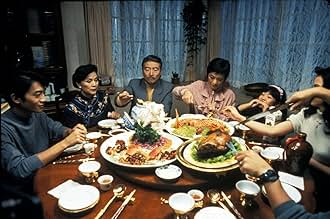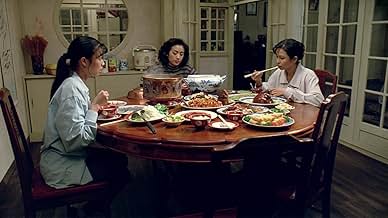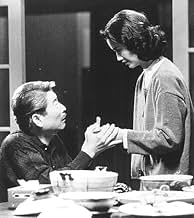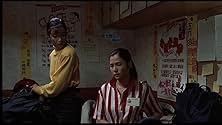IMDb रेटिंग
7.8/10
24 हज़ार
आपकी रेटिंग
अपनी भाषा में प्लॉट जोड़ेंA senior chef lives with his three grown daughters; the middle one finds her future plans affected by unexpected events and the life changes of the other household members.A senior chef lives with his three grown daughters; the middle one finds her future plans affected by unexpected events and the life changes of the other household members.A senior chef lives with his three grown daughters; the middle one finds her future plans affected by unexpected events and the life changes of the other household members.
- 1 ऑस्कर के लिए नामांकित
- 6 जीत और कुल 15 नामांकन
Wang Yu-wen
- Jia-Ning
- (as Yu-Wen Wang)
Chen Chao-jung
- Guo Lun
- (as Chao-jung Chen)
Ah-Lei Gua
- Madame Liang
- (as Ya-Lei Kuei)
फ़ीचर्ड समीक्षाएं
This movie is a visually sumptuous confection served up by Ang Lee as a follow-up to The Wedding Banquet.
While some people may be put off that the film is in Mandarin with subtitles (and the DVD does not have a dubbing option), the film is so strong visually that you forget about the subtitles and just admire the thoroughly delightful story.
I found the film's theme very interesting...that life constantly surprises, especially if one opens themselves up to life's possibilities.
Nothing in this film plays out like you expect it to. It is the single common thread between the multiple story lines. If this film has a flaw it is that too many of the changes happen too suddenly, without an examination of the processes that led to the sudden developments.
The food scenes in this film are to die for. In this case, as opposed to being a primarily carnal sensual experience as it is in films like "Chocolat" and "Like Water For Chocolate," food also takes on a rhythmic intensity and meter here. There is amazing energy and balance displayed in the preparation and presentation of the meal. Sort of like Feng Shui for the tummy.
Bon Appetit.
While some people may be put off that the film is in Mandarin with subtitles (and the DVD does not have a dubbing option), the film is so strong visually that you forget about the subtitles and just admire the thoroughly delightful story.
I found the film's theme very interesting...that life constantly surprises, especially if one opens themselves up to life's possibilities.
Nothing in this film plays out like you expect it to. It is the single common thread between the multiple story lines. If this film has a flaw it is that too many of the changes happen too suddenly, without an examination of the processes that led to the sudden developments.
The food scenes in this film are to die for. In this case, as opposed to being a primarily carnal sensual experience as it is in films like "Chocolat" and "Like Water For Chocolate," food also takes on a rhythmic intensity and meter here. There is amazing energy and balance displayed in the preparation and presentation of the meal. Sort of like Feng Shui for the tummy.
Bon Appetit.
10sochoi23
Being a female Asian American (1st generation), I definitely relate to the movie, especially the three daughters' devotion to their father and of maintaining and continuing family tradition. I loved the differences amongst the daughters: The older religious teacher daughter, the power executive daughter, and the teen aged daughter. However, no matter how their lives diverged, they were always brought back to the table by their ever-patient father. The little neighbor girl was absolutely adorable and the relationship between her and the father is endearing. The best scene is when she brings her lunch to school and the food is so lovely, tall of the children crowd around her and she's the hit of lunch period. Besides this movie, other Ang Lee films that are great are The Wedding Banquet and The Ice Storm and Crouching Tiger Hidden Dragon - need to see Sense and Sensibility and Brokeback Mountain (maybe even the Hulk), but this movie is my all time favorite - it makes me sad and wistful at times, but in the end, it always brings a smile to my face and touches my heart.
Preparing food is a lot like making and sustaining relationships; mixing hot and cold, balancing flavors, starting with good ingredients or not, being creative, adding spice and trying new things without losing identity and soul.
A master chef and his trio of mature and live-at-home daughters are each single, unattached and in a funk. Despite living under one roof they move in separate spheres and hardly communicate. Only Sunday dinners, painstakingly made by the father, bind them together. Passions flare as each family member finds themselves on the cusp of a new relationship. Ingredients long held in deep freeze are brought to the boiling point, disparate flavors combine, and the results are unexpected and startling. The point is to savor the dish and not interfere with the cook making it, for we hardly know enough to prepare our own meal much less those of other people.
Director Ang Lee is a master at metaphor and stewing passions. Even at this early stage in his career you may witness his power and prowess in such respects. A warning: do not watch this film on an empty stomach, for the cooking scenes will make your mouth water and whatever is in your pantry - be it raw flour or curry powder - will certainly be consumed in a fit of madness and feeding frenzy.
A master chef and his trio of mature and live-at-home daughters are each single, unattached and in a funk. Despite living under one roof they move in separate spheres and hardly communicate. Only Sunday dinners, painstakingly made by the father, bind them together. Passions flare as each family member finds themselves on the cusp of a new relationship. Ingredients long held in deep freeze are brought to the boiling point, disparate flavors combine, and the results are unexpected and startling. The point is to savor the dish and not interfere with the cook making it, for we hardly know enough to prepare our own meal much less those of other people.
Director Ang Lee is a master at metaphor and stewing passions. Even at this early stage in his career you may witness his power and prowess in such respects. A warning: do not watch this film on an empty stomach, for the cooking scenes will make your mouth water and whatever is in your pantry - be it raw flour or curry powder - will certainly be consumed in a fit of madness and feeding frenzy.
Ang Lee has turned what might have been merely an extended Taiwanese soap opera into a wise and warm exploration of family relationships, love and friendship, against the backdrop of a traditional society adapting to the modern world. Fascinating in themselves, the food preparation sequences serve as a metaphor for the skill required to transform bare existence into a rich life (and perhaps also as a metaphor for film making, where similar care and deftness are required).
The film focuses on the strained relations between master chef Chu (Sihung Lung) and his three unmarried daughters, and on the relationships of all four in love and at work. These relationships run the gamut from first love to love the second time around; from those based almost solely on sex to those based on none. (Some of the most touching scenes are those between Chu and his older colleague Wen (Jui Wang.))
Via the various workplaces Lee subtly shows us the changing face of Taiwanese society. Despite her father's profession, and seemingly with his approval, his youngest daughter works in a fast-food outlet; the eldest has converted to Christianity, and teaches science to boys, who treat her with a mixture of traditional deference and western-style insolence; the middle daughter is a successful airline executive, but only because time-honoured attitudes debarred her, as a woman, from following in her father's footsteps as a cook.
Unlike the classic Hollywood film, there is little out-and-out conflict in this movie, which seems to be based more on the Chinese philosophical concept of Yin and Yang, mutually dependent opposites. But whatever its underlying cinematic rationale, it is a masterpiece.
The film focuses on the strained relations between master chef Chu (Sihung Lung) and his three unmarried daughters, and on the relationships of all four in love and at work. These relationships run the gamut from first love to love the second time around; from those based almost solely on sex to those based on none. (Some of the most touching scenes are those between Chu and his older colleague Wen (Jui Wang.))
Via the various workplaces Lee subtly shows us the changing face of Taiwanese society. Despite her father's profession, and seemingly with his approval, his youngest daughter works in a fast-food outlet; the eldest has converted to Christianity, and teaches science to boys, who treat her with a mixture of traditional deference and western-style insolence; the middle daughter is a successful airline executive, but only because time-honoured attitudes debarred her, as a woman, from following in her father's footsteps as a cook.
Unlike the classic Hollywood film, there is little out-and-out conflict in this movie, which seems to be based more on the Chinese philosophical concept of Yin and Yang, mutually dependent opposites. But whatever its underlying cinematic rationale, it is a masterpiece.
I came across Yin Shi Nan Nu just by chance, when one day I was sorting DVD's in my local store. I was curious about the name in Spanish, and I have seen other movies by Ang Lee, but I have never repented for my sudden decision to take the movie home. This is a brilliant portrait of a family on the verge of being torn apart by their personal differences and the ominous presence of modernity, which has started to undermine the roots of the traditional Taiwanese family life. The presence of traditional Chinese Cuisine, in which Chu is both a master and the heir to hundreds of years of knowledge, serves as the perfect background to place the characters, as a metaphor for a way of life that is quickly disappearing, threatened by fast food and changes in family values. The director does not, however, focuses on mellow or sweetened scenes to show the conflict, but he maintains a humorous tone throughout the movie, placing the actors' performances on subtle gestures and witty lines which rely heavily on understatement and comedy-like situations. The basic premise of the movie suggests that change is not only inevitable but also necessary. However, the old values still need to be cherished and passed on to the next generation since they are the foundations which give sense and meaning to a life which tends to assimilate happiness to disposable items and economic success. In doing so, Chu and her daughters get reconciled, as well as their traditional background comes to terms with modernity.
क्या आपको पता है
- ट्रिवियाThe opening sequence - in which a Sunday lunch is lovingly prepared - took over a week to film.
- गूफ़As Chu is downing shots at the last Sunday dinner, he spills some on the collar of his jacket. When he stands up to makes his announcement, the stain is gone.
- साउंडट्रैकAve Maria
Composed by Giuseppe Verdi
Performed by The Westminster Choir
Courtesy of Chesky Productions, Inc.
टॉप पसंद
रेटिंग देने के लिए साइन-इन करें और वैयक्तिकृत सुझावों के लिए वॉचलिस्ट करें
विवरण
- रिलीज़ की तारीख़
- कंट्री ऑफ़ ओरिजिन
- भाषाएं
- इस रूप में भी जाना जाता है
- Comer, beber, amar
- फ़िल्माने की जगहें
- उत्पादन कंपनियां
- IMDbPro पर और कंपनी क्रेडिट देखें
बॉक्स ऑफ़िस
- US और कनाडा में सकल
- $72,94,403
- US और कनाडा में पहले सप्ताह में कुल कमाई
- $1,55,512
- 7 अग॰ 1994
- दुनिया भर में सकल
- $72,94,403
- चलने की अवधि
- 2 घं 4 मि(124 min)
- रंग
- ध्वनि मिश्रण
- पक्ष अनुपात
- 1.85 : 1
इस पेज में योगदान दें
किसी बदलाव का सुझाव दें या अनुपलब्ध कॉन्टेंट जोड़ें




















